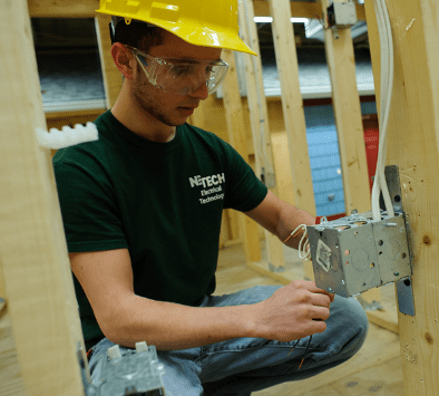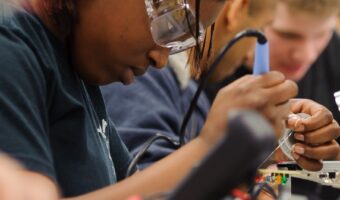Program Overview

In our Electrical Technology with Renewable Energy Systems program, you will develop the manual skills to wire and install electrical systems, plus the practical knowledge to support, explain, and troubleshoot a wide variety of electrical projects. An additional study term in renewable energy engineering covers topics to prepare you to become a “green” electrician or technician. Upon completing the course, you can pursue careers in renewable energy technology such as solar energy and wind generation.
You will be ready for entry-level positions constructing, installing, and maintaining solar and wind electricity generating systems for commercial and residential applications.
#RenewableEnergyAtNEIT
Read MoreFull Description
The Electrical Technology program with an emphasis on Renewable Energy Systems trains students for entry-level professions in the electrical industry. Some of the diverse careers open to graduates are construction electrician, maintenance electrician, photovoltaic installation technician, power system technician, electrical relay technician, electrical research technician, electrical distribution sales, electro-mechanical technician, electrical technical support, and entry level controls engineer are some of the diverse careers open to graduates.
The curriculum integrates electrical theory and practical application of alternative energy technologies. The renewable energy technology program prepares students to wire and installs electrical systems and apparatus and the mathematical and practical knowledge to support, explain and troubleshoot each application. Computer programs are an integral part of the associate degree program. This helps students practice circuit calculations, create working models that simulate real circuit conditions, and support classroom lectures and demonstrations.
The study topics in the associate degree include renewable energy sources and energy conservation practices. Students also study the safety rules, protocols, and procedures laid out in the national, Massachusetts, and Rhode Island electrical codes and the OSHA standards for the construction and general industries. They follow all the codes and standards mandatory under the individual state legislature. By connecting the electrical codes and class/lab work, students become proficient and willing to research electrical industry standards to support their work.
Laboratory projects, ranging from elementary breadboard experiments to advanced PLC ladder logic control circuits, provide hands-on experience to develop wiring techniques and to simulate actual job conditions in residential, commercial and industrial environments.
Upon completion of the Associate in Science Degree in Electrical Technology, the graduate is qualified to seek employment in entry-level careers in the electrical industry and are qualified to work as an apprentice electrician or technician. Associate degree graduates can also continue in the New England Institute of Technology’s (NEIT) Bachelor of Science in Electrical Engineering Technology, Construction Management, or Business Management programs.
For those interested in careers in the sustainable renewable energy fields such as solar photovoltaic arrays, wind generation (turbine), tidal generation and fuel cell technologies, an additional term specifically addresses these careers and the unique techniques and standards students must learn to become competent as “green” electricians or technicians.
Upon successful completion, students may earn an additional Associate in Science degree in Electrical Technology with a concentration in Renewable Energy Systems. Additionally, since the North American Board of Certified Energy Practitioners (NABCEP) certifies the “Green Term,” students, upon completing the program, would be eligible to appear for the NABCEP Associate certification.
The “Green Term” is available not only for current Electrical Technology students, but also for Electrical Technology graduates as well as for non-NEIT students provided specific requirements are met (i.e., electrical licensing, electrical contractor, and electrical engineer).
Job Outlook in Rhode Island (RI)
According to the Bureau of Labor Statistics (BLS), the solar and wind energy network will require 50% more workers by 2029. Solar photovoltaic installers will be the top job, followed by turbine technicians in wind energy technologies.
The number of jobs in wind energy technologies will increase from 7,000 to 11,300, and those in solar energy technologies will increase from 12,000 to 18,100. This is almost 60.7% and 50.5% jump between 2019 and 2029.
According to another report by the Rhode Island Office of Energy Resources (OER), the overall increase in jobs in the renewable energy sector between 2014 and 2020 in RI is 74%. This figure includes those with associate degrees in renewable energy engineering technology.
Despite its size, Rhode Island is among the top three states in the US for energy efficiency programs and innovation that directly engages over 1,100 firms.
The statistics clearly portray a bright future for students pursuing associate degree programs in electrical and renewable energy technology.
NEIT Campus that Offers this Degree in renewable energy
The NEIT campus that offers the Associate Degree in Welding is the Access Road Campus, located at 110 Access Rd #65, Warwick, RI 02886.
License Requirements in Rhode Island
According to the Office of Energy Resources, state of Rhode Island, Renewable Energy Professionals (REPs) can hold a limited license to perform installation work without having an electrician’s license. However, an electrical contractor’s license already includes the work under a REP limited license.
There are various ways you can get a REP license in RI:
- If you have an associate degree or higher in renewable energy technology or solar PV installation from an accredited school.
- If you have a certificate from the SEI Solar Professionals Certificate for photovoltaic systems.
- If you have a certificate from the North American Board of Certified Energy Practitioners (NABCEP) as a PV installation professional or a solar heating installer.
- If you have a certification from Underwriter Laboratory’s (UL) PV installer certification program.
Salary Data for Renewable Energy Professionals in Rhode Island
The Bureau of Labor Statistics website data shows the median salary for solar photovoltaic installers as $44,890 and that of wind turbine service technicians as $52,910 as of 2019.
A Rhode Island clean energy industry report from 2020 shows the median hourly wage of electricians working in renewable energy technology is $21.46 to $45.57, depending on the type of job and the experience.
Potential Career Opportunities
Renewable energy is the future. There is an increasing emphasis on shifting to renewable energy under the United Nations Sustainable Development Goals (UNSDGs).
Elsewhere, 200 countries worked before and during the COP26 summit to commit actions to shift from fossil fuels to renewable energy technology. The career opportunities in this area are abundant. Various types of career opportunities open to graduates of renewable energy technology associate degree programs are:
Solar Systems Installer
Wind Turbine Technician
Energy Audit and Efficiency Technician
Geothermal and Solar Photovoltaic Installers
FAQ
-
Is Renewable Energy a Good Career Choice?
Yes, certainly! Large consumers of fossil fuels are rapidly shifting toward renewable energy technologies. Countries are not only concerned about climate change but also the finite quantity of fossil fuels the planet can produce.
Renewable energy is the future, from electric vehicles (EVs) to solar power generation to wind electricity generating systems to biomass.
As a result, the renewable energy field holds great promise in terms of sustainability and job opportunities. Smart and innovative individuals will find excellent professional opportunities in the energy sector.
-
Is Electrical Engineering Related to Renewable Energy?
Yes, they are related. The purpose of renewable energy systems is to provide advanced technology to produce and supply electricity. Students interested in electrical engineering technology can choose to specialize in the renewable energy sector.
-
What Degrees Are Best for Pursuing a Career in Renewable Energy?
If you want to work in the industry as an engineer, you can consider associate degree programs or bachelor’s degrees in renewable energy. You can further choose to work as an electrical installation and maintenance engineer, an energy efficiency auditor, or a technician in the manufacturing of photovoltaic systems/control systems.
-
Is Renewable Energy the Same as Sustainable Energy?
No. While both sustainable energy and renewable energy are critical to our planet’s future, there are important distinctions between the two. Renewable energy comes from substances that the earth can gradually replenish. Examples include biomatter, wood, and water.
Sustainable energy comes from sources that cannot deplete. Examples include solar, electric, and wind energy. Renewable energy is not always sustainable, and sustainable energy sources are not always renewable.



